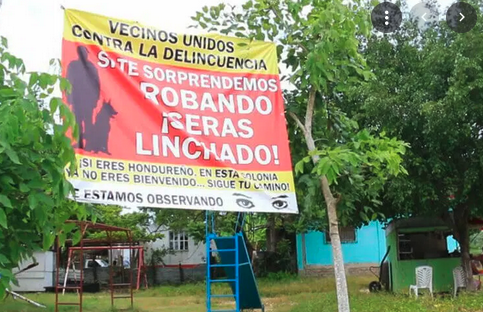‘If we catch you stealing you will be lynched!’ reads a sign
by Mexico News Daily
Residents of a small town in Chiapas are sending a clear and hostile message to Honduran migrants, whom they accuse of crimes such as rape, robbery and drug trafficking.
“If we catch you stealing you will be lynched! If you’re Honduran you’re no longer welcome in this neighborhood … continue on your way! We’re watching you,” read banners hung by a citizens’ group at various points in Pakalna, a community about five kilometers from Palenque.
According to a local government official people are fed up because Pakalna has been “invaded by violence.”
Leopoldo Contreras told the newspaper Milenio that federal authorities are aware of residents’ concern about the situation in Pakalna but have refused to relocate a shelter that attracts migrants to the town.
However, due to the residents’ threats toward migrants and its own personnel, the Jtactic Samuel Ruiz García shelter recently decided to close its doors. Contreras said residents want the closure to be permanent.
“… We don’t despise [migrants]; on the contrary we’ve helped them with work and food [but] we want [the shelter] to be closed and [the migrants] removed,” he said.
It’s not the first time that residents of Pakalna have shown hostility toward migrants. In March 2020, residents attacked and expelled some 130 Central Americans who had been staying in a local auditorium. They too were accused of committing crimes in the town, including robberies and assaults on women.
With the town’s shelter currently closed, exhausted migrants – who likely entered Mexico via the border with Guatemala in Tabasco – are sleeping on the streets, Milenio said. “Many commit crimes due to hunger and a lack of work,” the newspaper said.
However, one Honduran migrant who said he walked through jungle for four days to reach Pakalna said he just wanted to rest.
“One comes with the hope of resting for at least one day or a few days but we arrived to see the migrants’ shelter closed,” said Javier, who was forced to bunk down outside.“It was a critical situation for us last night because it rained,” he said.
Barefooted and wearing wet clothes after sleeping on a park bench, another Honduran said it was a shame that the shelter is closed. Luis said that a small number of migrants who have committed crimes in the town have given all migrants a bad name.
“In the vineyard of the Lord … there are good people and bad people. Unfortunately those who come with the intention of doing damage ruin the path for those of us who come in peace and with the hope of finding a better course for our lives,” he said.
The director of the Jtactic shelter claimed that “some political leaders,” whom he didn’t name, are behind the threats toward migrants.
“There was a very belligerent group that ordered … people to go to the shelter with sticks and machetes as if we were criminals. I just want to say that [the threats and aggression] are documented before the National Human Rights Commission [CNDH] and also in a preliminary [criminal] investigation,” said Alberto Gómez, who is also a priest.
Fearful of more threats and the possibility that the shelter could be attacked, the Chiapas bishops’ association called on the federal government to provide a security guarantee so that the casa del caminante (wayfarer’s house), as the shelter is officially called, can reopen.
“We’re convinced that joining forces to attend to migrants as best we can with clear and concrete policies and actions that respect their dignity is urgent,” the association said in a missive directed to the federal government and the CNDH.
It said it has evidence of “campaigns of hate and xenophobic intolerance” that were carried out in Pakalna and forced the shelter’s closure.
Gómez rejected Contreras’ call for the shelter to shut permanently, asserting that not only should it reopen but a second facility should be built.
“We need a second shelter because [the Jtactic shelter] is unable to welcome a lot of people. Migration flows will keep growing and it’s not true that the flow will end with the removal of the shelter,” he said.
Record numbers of migrants have arrived in Mexico this year, including large numbers of Hondurans and Haitians. Many have been detained in the country’s south but thousands have reached northern border cities such as Tijuana, Reynosa and Ciudad Acuña.
With reports from Milenio



